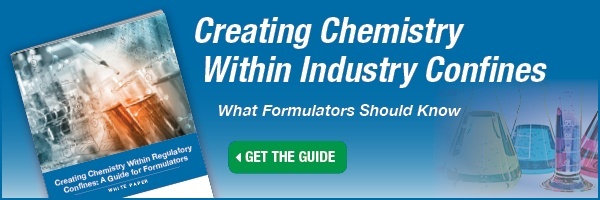
How Can You Achieve Chemical Compliance?
Sea-Land Chemical Company |
No matter your job title or the nature of your chemical company, your work is overseen by a number of strict regulations applying to materials, formulas and end products to ensure chemical compliance. As you may already know, it can be extremely time-consuming to parse and understand all the domestic and international rules and regulations that might apply to your business. However, failing to follow these governmental standards can result in significant financial or operational penalties.

We all want to ensure worker safety and help protect the environment, but which specific chemical regulations apply to YOUR business? Here’s a brief overview:
Domestic (US) Regulations for Chemical Compliance Include:
1. The Toxic Substances Control Act (TSCA)
Administered and enforced by the Environmental Protection Agency (EPA), the TSCA is a master list of all chemical substances (called the Chemical Substance Inventory) manufactured, processed or imported into the US.
TSCA’s primary focus is prohibiting the manufacture and importation of chemicals that are not on the list or which are exempted, and also regulating the listed chemicals which are in use. For example, if your company wants to manufacture a new chemical that is not on the list, you must notify the EPA of your intent by filing a Pre-Manufacturing Notice (PMN).
2. Occupational Safety and Health Administration (OSHA) HCS
OSHA is part of the US Department of Labor, mandated to make sure that workers stay safe on the job. Part of the OSHA regulations is a section called the Hazard Communication Standard (HCS), aka the Right to Know standard. The HCS requires your business to provide your employees with information about the identity and hazards posed by the specific chemicals (or anything else) present in your workplace and how your workers can protect themselves.
3. Federal Food, Drug, and Cosmetic Act (FFDCA), Chapter VI, Cosmetics
This Act authorizes the FDA to oversee the safety of food, drugs, and cosmetics. Personal care products are regulated as cosmetics under the FFDCA. The FDA also has the authority to inspect your facility and, if need be, to remove cosmetics from the market. FFDCA is especially important since all products containing prohibited ingredients must be reformulated.
4. National Sanitation Foundation Regulations for Non-Food Compounds
The National Sanitation Foundation (NSF) is the only independent, third-party organization that offers product registration for nonfood compounds and incidental food contact such as lubricants, cleaners and water treatment chemicals used in food and beverage processing. Manufacturers, regulators and consumers look to the NSF to develop public health standards and certifications that help protect food, water, consumer products and the environment.
Voluntary Actions:
Your company can also take any of a number of voluntary actions to show your commitment to excellence and product quality. Voluntary actions include Safer Choice, a voluntary program administered by the EPA that encourages innovation in the chemical industry. For example, your company can apply to have your products evaluated by the Safer Choice Program and if approved, can boast the Safer Choice label as a safety and quality marker.
International Chemical Regulations Include:
- In the European Union (EU) the main laws for regulating the production and use of chemical substances is the Registration, Evaluation, Authorization, and Restriction of Chemicals regulations, commonly known as REACH.
- The Government of Canada regulates chemicals through The Canadian Environmental Protection Act (CEPA) of 1999. The Act separates chemicals into new and existing substances, and CEPA also maintains lists of toxic and prohibited substances.
- In the Asia-Pacific region (APAC), each country often has its own set of regulations and requirements, which makes it challenging for companies to comply. Many are outlined and discussed in The Chemical Regulations Updating in Asia Pacific – Report for 2017.
Chemical Compliance Tips:
- A good strategy for understanding chemical regulations is to treat each one like a formulation, adding one ingredient at a time.
- With a little patience and insight, you’ll experience less frustration and be more successful at attaining total compliance.
- Take full advantage of all the resources which the regulating bodies offer to help you interpret their regulations. Also take the time to understand which ones specifically apply to your business.
Your Quick Compliance Resource:
Nowadays it’s easy to find chemical regulations online, but understanding them is another matter. Learn how to navigate these chemical standards in our latest white paper, Creating Chemistry Within Industry Confines: A Guide for Formulators. We’ve made it easier to under-stand what the requirements are for the exact type of work your company does with chemicals, all to help you achieve compliance and produce a safer, better product.




